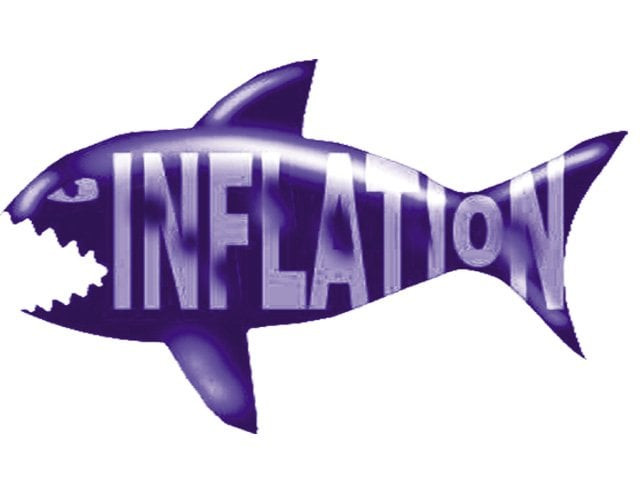Core inflation eases, but experts raise eyebrows
Ministry officials attribute the decline to stagnant house rent.

According to the PBS, overall inflation measured by CPI rose 7.4% in February over the corresponding period of last year. DESIGN: ASAD SALEEM
Fuel and food-adjusted inflation has slightly eased to 9.6% in February over a year ago, but this has surprised independent experts who believe that this core inflation must have gone up because of excessive money supply.
Core inflation, excluding volatile food and energy prices, slipped from 9.9% in January, according to figures released by the Pakistan Bureau of Statistics here on Friday.
“If money supply has any impact on inflation, it must go up,” said Dr Ashfaque Hasan Khan, Dean Business School of National University of Science and Technology. Otherwise, he said, the State Bank of Pakistan should announce that inflation is not a monetary phenomenon.
Experts give more importance to core inflation since it is shielded from seasonal price shocks due to exclusion of food and energy products.

Though the experts have their own views, government officials also staunchly defend themselves. According to finance ministry’s experts, house rent that has 22% weight in the overall Consumer Price Index (CPI) inflation basket and almost 50% in core inflation remained stagnant in February, which led to the drop in core inflation. There was no major increase in other items as well, they stressed.
They were of the view that money supply was one factor among many and moreover the money supply was increasing from the supply side.

The government’s persistent failure to stop power subsidies and increase revenues is leading to more than targeted budget deficit. To bridge the yawning gap, the government is heavily borrowing from commercial banks. And to avoid any disruption in the flow of funds, the central bank is providing liquidity for banks, increasing the currency in circulation.
According to the PBS, overall inflation measured by CPI rose 7.4% in February over the corresponding period of last year. This shows that the rate of increase in inflation, recorded at 8.1% in January, has slowed down, at least temporarily.
The inflation figures are contrary to the expectations of the International Monetary Fund that has projected double-digit price rise in the second half of the current fiscal year 2012-13. Based on its assessments, the IMF has advised Pakistan to tighten monetary policy.
According to an analysis of Shajar Capital, while CPI continues to stay in single digit, a looming risk to the state of economy is the weakening external position and its impact on currency.
It, however, cautioned that the fresh increase in domestic fuel prices on the back of relatively higher international oil prices puts upside pressure on CPI going forward. There is a risk that a sustained upward trajectory in international oil prices can have a negative impact on domestic CPI and foreign exchange reserves, it said.
Average inflation in the first eight months (July-February) of the current fiscal year increased 8.2% over the same period a year ago, according to the PBS.
Published in The Express Tribune, March 2nd, 2013.
Like Business on Facebook to stay informed and join in the conversation.


















COMMENTS
Comments are moderated and generally will be posted if they are on-topic and not abusive.
For more information, please see our Comments FAQ